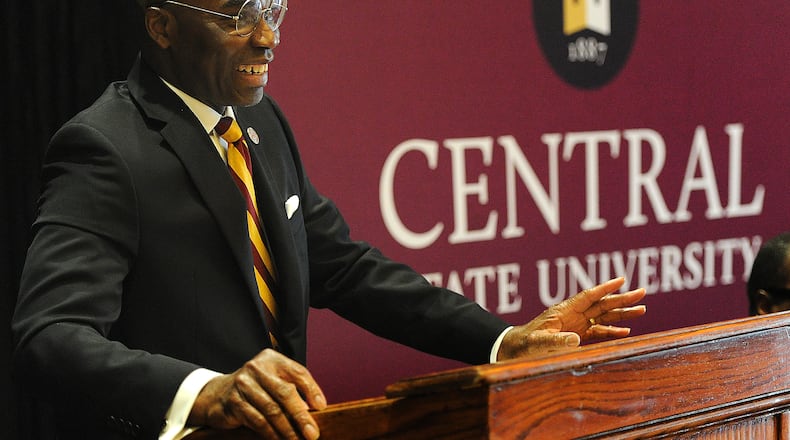Kuti earned his Bachelor’s degree at Central State University. He has also earned a Master of Business Administration in finance from St. Thomas University, and a doctorate in public policy and administration from Walden University.
In his more than 30 years working for CSU, one of two Ohio Historically Black Colleges and Universities, Kuti said he credits what he’s learned from past presidents, from students, and from colleagues for his ability to assume the presidency of Central State.
“I stand here today as a symbol of our collective successes,” Kuti said during his remarks Friday. “I intend to make the board very proud of this decision.”
Kuti said his priorities for the presidency include promoting and expanding the university’s research in food and agricultural sciences, continuing Central State’s research and community outreach in promoting health and nutrition outcomes, especially for African Americans, and expanding opportunities for students in fields of national security.
“There’s a significant difference between the health outcomes for the majority population of African Americans, so one of our roles as a university is to decrease that gap,” he said.
More than 55 candidates applied for the position, said Jacqueline Gamblin, chair of the university’s board of trustees, eventually narrowing down the search to three possible candidates as finalists over the course of about five months.
“He is really focused on outcomes. He has a history of success, of producing and delivering based on evidence based data,” Gamblin said of Kuti. “And we have a lot of initiatives that are important to us. We have a lot of momentum and we wanted someone who could continue to move us forward as we continue to look at our programs and review, and also just enhance the student experience.”
Alex Johnson has been serving as interim president of CSU during the search process, after the university did not renew Jack Thomas’ contract when it expired last summer.
Thomas stepped down at the end of June last year amid scrutiny and allegations of discrimination and harassment. Kuti declined to comment on the allegations, citing ongoing litigation.
“I can say that we’re going to be a very inclusive, very open, very transparent administration, and we are going to treat everybody based on their qualities, their expertise, their knowledge, and their belief and understanding of CSU’s mission, and we treat everybody the same,” Kuti said.
Personnel issue
Immediately after Kuti’s hiring Friday, multiple sources made the Dayton Daily News aware of a 2023 State Personnel Board of Review case involving Kuti.
A longtime CSU employee, Subramania Sritharan, had his contract nonrenewed by Kuti in 2022, 18 months after Sritharan had raised concerns about the appropriateness of CSU using federal grant funds to pay part of Kuti’s salary in a new position.
The Personnel Board found in August 2023 that Kuti’s decision to oust Sritharan was improper, and called for him to be reinstated. The board called Kuti’s reasons “not reliable or credible because of the complete lack of evidence” and said Sritharan had suffered “retaliatory discipline in the form of loss of employment.”
Sritharan was reinstated in November 2023, but almost immediately faced a grievance from the American Association of University Professors on a separate matter — that being a full faculty member was a requirement for his position, and he was not, according to the union’s collective bargaining agreement. Sritharan was again removed from his position as Associate Director of Research in December 2023 pursuant to an arbitration decision on the grievance.
Asked about the State Personnel Board’s findings about Kuti, Central State officials pointed to Sritharan’s December removal from his job, and supported Kuti.
“The Board of Trustees made an informed decision in the selection of Dr. Kuti and is confident that he is the right person for the job,” said Laura Wilson, CSU’s general counsel.
About the Author


